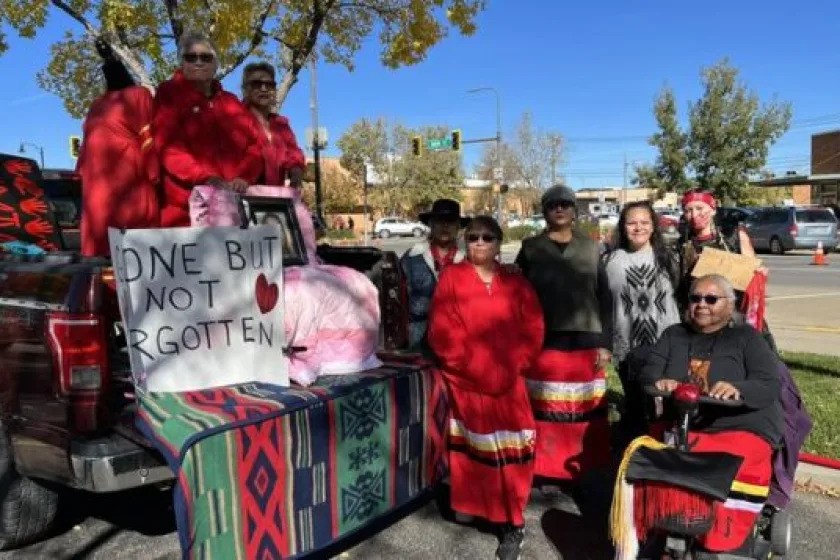
Team of Midwestern women leads home-grown fight against Missing and Murdered Indigenous People crisis
Day after day, Lily Mendoza works to heal family and community through the Red Ribbon Skirt Society. She dedicates her life to saving the lives of others.
Lily Mendoza aims to reconnect with her Lakota roots over the next two years so that she can bring songs, prayers, and traditional ceremonies back to the families she serves. (Courtesy of the Bush Foundation via Grand Forks Herald)
Mendoza, a citizen of South Dakota’s Cheyenne River Sioux Tribe, founded the society eight years ago to alleviate the crisis of Missing and Murdered Indigenous People. She advocates for resilience through building cultural identity among the Lakota people.
Since 2016, women in the Northern Plains area have joined the society to organize events, assist families, and raise awareness of the issue. Mendoza consults, travels, and speaks, often without remuneration. Based in the Black Hills, she focuses on the surrounding areas in North Dakota, South Dakota, Minnesota, and Montana.
Now Mendoza can continue her work with a grant from the Bush Foundation, which specifically serves the same geographic area.
“She will seek teachings from Lakota elders, tribal leaders and sacred sites — and take time to heal herself so that she can lead from an informed Indigenous perspective and help more families find healing in Lakota lifeways,” the foundation website states.
Her Bush Fellowship, announced June 11, is among 24 available spots in the annual competition. Recipients receive grants of $100,000 each to fund leadership plans. Fellowships last 12 to 24 months.
Grief and the loss of a loved one set Mendoza on this path. Her son died of diabetes when he was 21 years old back in 2012.
“You know, when you lose a child, or you lose anybody, but specifically a child, you go through a lot of grief,” Mendoza told Buffalo’s Fire. “My other son was very close to his brother and we were just falling apart as a family. I started as a mother, as a parent, a grandmother, trying to help my children heal, bringing everybody together.”
Early during her MMIP work, she met another mother who was grieving a child.
“When I reached out to that mother, she said nobody had asked her in a really long time, ‘How are you doing?’ She had lost her daughter who was 11 years old.” The girl had gone missing and was murdered. “So we just began building a relationship,” Mendoza said.
“She was doing the same things that I was doing –– sitting on the couch, sitting on the bed, just not wanting to do anything anymore,” said Mendoza. “And she had been doing that for quite some time.”
Mendoza provided emotional support that family members of MMIP often don’t receive. The two formed a friendship stimulating the Red Ribbon Skirt Society. “Now she’s able to go out and speak, be a voice for her daughter. Some of the other women I’ve reached out to are also part of the society,” Mendoza said.
The group name originated with the decision to wear jingle dresses and red ribbon skirts at events to spread awareness. The color red often symbolizes the MMIP victims who have been silenced.
According to the Bureau of Indian Affairs, around 4,200 missing and murdered cases remain unsolved. Approximately 1,500 missing American Indian and Alaska Natives are registered in the National Crime Information Center. The Not Invisible Act Commission issued a report last November providing details of the national crisis of MMIP across the country. The Interior and Justice departments responded to the commission’s Not One More report.
Related Articles
U.S. Rep. Betty McCollum joins calls for Biden to drop out of presidential race
A wet summer can mean more mushrooms — and increased odds of eating the wrong ones
Discover the sweet health benefits of summertime melons
‘A bottomless pit’: How out-of-pocket TMJ costs drive patients into debt
Study: Inconsistent sleep leads to higher risk of type 2 diabetes
For the last 35 years Mendoza’s base has been the Black Hills where she and her son own a small book business specializing in literature by Native American authors. This location is where she’s raised her children and grandchildren. She grew up on the Cheyenne River Indian Reservation, where she graduated from high school before moving on to Black Hills State University for her degree.
The Red Ribbon Skirt Society now has about 25 active members in and around Rapid City, S.D. The group is all-volunteer and doesn’t accept any federal or state funding. “We are just a group of women that volunteer our time to this cause,” said Mendoza. It consists mostly of mothers, grandmothers, and members of those families that have lost individuals,” she said. “They go out and speak, they spread awareness and they really are a voice for their lost one and for other women and children as well.”
In addition to hosting events and amplifying the voices of families, participants help families through court processes. This includes meetings with attorneys general, victims’ assistants and investigators. Mendoza said Red Ribbon Skirt Society members accompany community members to court hearings when asked by families uneasy with the legal system.
Prayer is a significant part of the group’s activity. At events, Mendoza usually asks if someone can speak or sing in Lakota. She sometimes finds no one to recite certain prayers in the Native language. “We need to smudge and we need to put tobacco down to prepare for this,” said Mendoza.
The Bush Fellowship is to strengthen her Lakota roots. “It’s to reconnect and learn about my traditional ceremonies, because I need to learn these things,” Mendoza said.
Throughout the next two years, Mendoza expects to learn her songs, how to help run a sweat lodge ceremony and better ways to commune with nature. “I’m going to the sacred sites that are here in South Dakota and also beyond,” said Mendoza. “There’s a sacred site in Wyoming, which I will be going to as well. And just in spending time there, connecting to the land, connecting to the person I need to be, a Lakota woman.”
She plans to share the knowledge of her cultural heritage with others in the Red Ribbon Skirt Society and families needing support. She wants families to incorporate these teachings into their healing journeys.
“I hope that somehow in the future that I can carry on those teachings and pass those on to younger women,” said Mendoza. “As well as to pass those on to still those women that are my age and older.”
This story was originally published on BuffalosFire.com.
Related Articles
Literary picks for week of June 23: Native American words and music are on display this week
MN Historical Society agrees to return 1862 ‘Mankato hanging rope’ to Prairie Island Indian Community
St. Paul, native community break ground on Wakan Tipi Center in Dayton’s Bluff
U.S. Department of Justice notes efforts, partnerships addressing MMIP crisis
Prairie Island Indian Community seeks ‘hanging noose’ of 1862 from MN Historical Society

